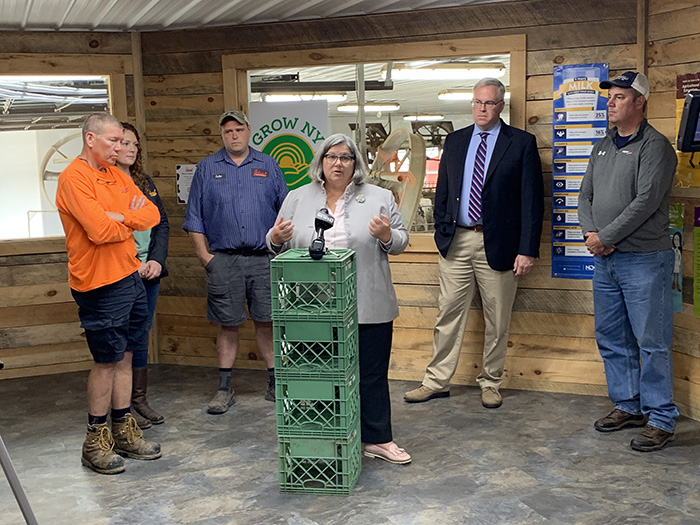By Zander Frost, Chronicle Staff Writer
Dairy farmers joined by Republican State Senator Dan Stec and Democratic Assemblywoman Carrie Woerner held a media event at Ideal Dairy Farm on Wednesday, Sept. 29, imploring the state wage board not to reduce from 60 hours to 40 the threshold when farms must pay time-and-a-half overtime.

They said it would be disastrous for New York’s dairy farms — driving up their costs and driving off their workers. “When you talk about the amount of dollars affected by going from 60 to 40 hours overtime, in my business that’s about a third of the size as [Ideal Dairy], it’s $120,000-$150,000 a year in added costs,” said Bill Peck, a partner at Welcome Stock Farm in Schuylerville.
“So those types of dollar expenses, are very difficult for…us in New York, in particular, to compete.”
Luke Getty of Ideal Dairy said, “If this is a worker rights issue and a fairness issue, I think they need to get out on some farms and talk to some of these guys and find out what it is that they want….In the reality for the majority of our employees, they want the hours. They want the ability to make more money.”
The farmers, locked into milk prices they don’t control and heavy fixed costs in land, machinery and livestock, said they simply can’t afford to pay time-and-a-half overtime.
“For a time this summer,” Mr. Getty said, “we went to six days on, two days off to try to give the guys more free time and less hours, and during a period of about a month we lost four guys that went to work on dairies in Michigan where they could work as many hours as they want and make more money.”
“…They’re not getting paid any overtime. But they have the ability to make more money per week. There is no way that we can afford to go to overtime after 40 without adding people and that is going to reduce weekly take home pay.
“…I don’t know if there’s enough people out there to fill all the positions that we would want to fill,” he said.
Mr. Peck said, “Right now we’re seeing that, as some farms transition to the 60 hour week, we saw some of those employees go to Pennsylvania, go to Ohio, Georgia, Michigan, because it’s about how much money individuals, particularly our Hispanic workforce, how much they can make in a week, so that they can send part of it home, to their homeland.”
Mr. Peck said the labor hours needed aren’t going to come down. “For the safety and welfare of the animals, for the safety and welfare of your business, we need attention around the clock….The question is…How can we stay in business?”
He said the only option would be “to shorten people’s hours up for the week, trying to hire more people, and now we have less take home pay per individual. So what’s the first thing they’re going to do? They’re going to look to go elsewhere, where they can make it.”
Assemblywoman Woerner said, “In New York, we have a lot of regulations and policies that add cost to the production of any product. So we really have to be very careful in how we how we put the mandates on these businesses, because they do not have the ability to simply raise their prices.”
She said dairy farmers “take a price that is a nationwide price…..When costs go up in most businesses, you know what? Walmart raises its prices. McDonald’s raises its prices. But dairy farms, when their costs go up, they don’t get to raise the price….
“And that creates a very difficult situation for anybody that’s trying to run a business, let alone somebody that’s trying to run a business and invest $10 million dollars to provide a path forward for the next generation of farmers.”
Senator Stec said, “There are farms, small farms and good size farms for New York standards…that are literally making the decision whether or not to continue farming in our state.
“That’s a heck of a decision to make on something that is very capital intensive. And yet New York through its pre-pandemic actions over the years, we have pushed this industry, just like we did manufacturing, to the brink of making that decision. Do I stay or do I go?…
“While the land isn’t portable, the labor force is. Again, what our business owners…and others in the agricultural sector in New York are saying is that the very employees that we are purporting to be looking out for and their interest, are voting with their feet. They are sending the message.”
John Dickinson is the fifth generation of his family to operate Ideal Dairy, and he said they’ve taken steps to try to keep it viable for 6th and 7th generations.
In 2017 they combined business with Kyle and Luke Getty and their families.
And they made a $10-million investment.
“We traveled around the country and we got an opportunity to see how competitive or difficult it was in other parts of the country…the advantages they had…to produce milk,” Mr. Dickinson said.
“And we settled on this particular system behind me because we felt that we could be competitive down the road — for these people for the next 30 years of their careers.
“When we built this facility, Denise and I leveraged every dollar of equity, five generations together here. We’re highly leveraged to pull it off. A $10 million investment. And what we did with that investment is we increased our labor efficiency by 40% to 50%.
“That gave us an opportunity to improve the care of our cows. To improve the compensation and the quality of life for our people. And it gave us a chance to provide more resources to address some of the issues environmentally…embrace new technologies for climate change.”
The press conference was arranged under the auspices of an association called “Grow NY Farms.”
It said, “Later this year, the New York State Wage Board will revisit the 2019 Farm Laborers Fair Labor Practices Act’s 60-hour overtime threshold for farmworkers and determine if an adjustment to 40 hours will be necessary.”
The event was billed as “an opportunity for the media, elected officials and stakeholders to have an inside look at the real implications of a lowered threshold.”
John Dickinson, Ideal’s 5th generation: Heavy investment, key role of Hispanic workers
John Dickinson, the fifth generation of his family to operate Ideal Dairy in Hudson Falls, said farming has always depended on “people who wanted to put in extra time, extra labor to get further ahead in life.
“My great grandfather, after he got done milking eight cows, he walked out into the Five Combines to make enough money to pay the mortgage.”
“And then when I look back through my life, through the 60s, 70s, 80s people came here because they knew they could work as many hours as they wanted to work. And that’s how they got ahead in life. Didn’t matter what their education was, they could come here, no limitation on what they wanted to do.
“So then we get to the 80s, things started to shift. There was more, there was employees that wouldn’t show up, didn’t care if they came to work. So we had a cultural shift. And we were having difficulty finding those kinds of people that would fit into our culture.
“Then it was the foreign workers who started to make the scene — who shared the same attitudes and culture we did. They came here to make as much money as they can make. So the time, money, relationship was something that fit well with us.”
Those workers are largely Hispanic, and he says they want as many hours of work as they can get.
Mr. Dickinson says, “In 2017, we started paying overtime. And we were able to compensate them the same by paying them overtime for an extra five hours, and make adjustments with their lunch schedule, so they can maintain, they can work 65 hours instead of the traditional 70 to 80 and still maintain their quality of life….
“We got quite a bit of pushback from that initially, because we were taking hours away from them….
“So when we look at this new challenge of 40 [hours], what are we going to do?… We’re going to tell people, you no longer can work all the hours you want to get as forward in life as you want?”
He said, “The economic situation of the dairy industry right now isn’t going to afford us the opportunity to pay overtime over 40. This is just not attainable. So we have to have some kind of hybrid, do something similar, that will keep this business viable, and still allow them to make the same quality of life they had.
“I mean, they’re not going to be happy with us lowering their wages [actual dollars earned], because we can’t afford it. What are they going to do, are they going to go get a second job? The foreign workers can’t do that. I mean, not easily.
“Are we just going to pay the extra money or pay part of the money? I don’t know, right now. Inflation is going on. We just can’t afford to pay overtime.”
— Zander Frost
Copyright © 2021 Lone Oak Publishing Co., Inc. All Rights Reserved
 Glens Falls Chronicle Serving the Glens Falls/Lake George region; Warren, Washington and northern Saratoga counties since 1980
Glens Falls Chronicle Serving the Glens Falls/Lake George region; Warren, Washington and northern Saratoga counties since 1980


